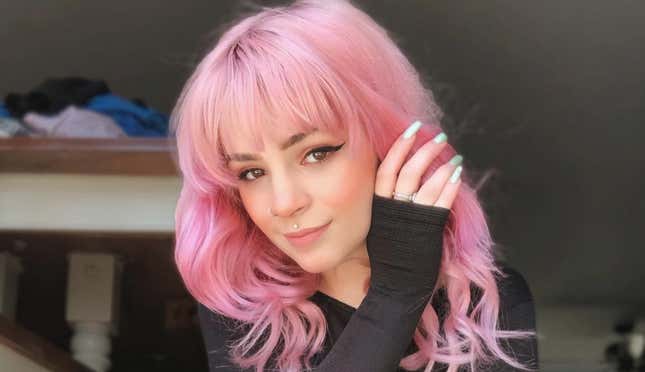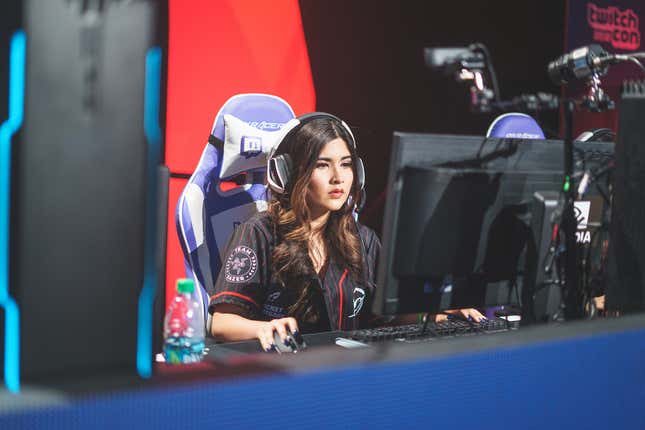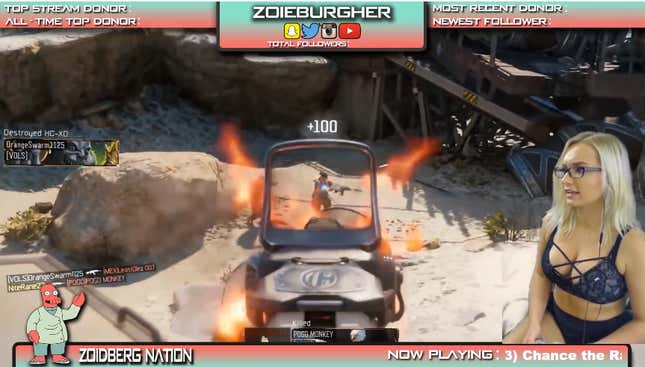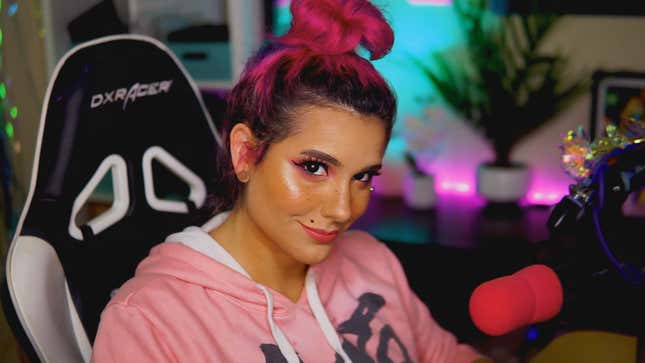
Jayden “YourPrincess” Diaz is haunted by the term “egirl.” A League of Legends streamer competing among the top two percent of players, Diaz hasn’t been able to escape it for years—every day in Twitch chat, in League of Legends games and across social media.
“I let it really hurt me,” Diaz, 20, told Kotaku of the word, which she defines as a woman who “exploits the fact that she’s a girl to get attention online.” Diaz, with curled lengths of brown hair and a polished fashion sense, says viewers have called her a glorified camgirl throughout her career as a professional gamer. “I let it control even the role I played in League,” she explained, adding, “I used to main support, but I stopped playing support because I hated being called a ‘boosted egirl,’” or a woman whose high League rank was earned by someone else.

“Egirl” is a word that has followed female Twitch streamers and cosplayers around for years. Derogatory by nature, “egirl” is wielded by naysaying trolls to undermine a woman’s legitimacy as a true gamer and nerd based on her looks or internet popularity. In 2013, right before it hit the mainstream, one Urban Dictionary user’s early classification of egirls went, “Often seeking the attention of professional gamers. . . Live sightings of eGirls can be found at gaming LANs.” As gaming culture moved onto Twitch, and streamers garnered a modicum of micro-celebrity, public-facing girl gamers like Diaz began receiving the popular put-down and have been waging war on it ever since.
Yet over the last year, egirl has taken on another meaning. If you’re not a teenager on the short-form mobile video app TikTok, you might not have noticed. I asked Diaz to run a Google image search for “TikTok egirl,” which brought up hundreds of pictures of primly made-up teen girls sticking their tongues out in high-fashion streetwear. “What the fuck?” said Diaz, laughing in disbelief. “Dude, it’s a whole fashion trend now.”
In a recent article in the fashion and lifestyle magazine Dazed, a young girl with heavy, winged eyeliner and cropped, slime-green hair stares menacingly at the camera. Around her neck is a dog collar, and her lips and cheeks are dark red smudges. “E-girls and boys’ style is the antidote to the homogenised IG [Instagram] aesthetic,” the headline reads. The article goes on to detail how Gen-Z influencers who describe themselves as “egirls” are “mixing alternative aesthetics like thick chains, chokers, monochrome stripes, and dramatic eyeliner with softer, anime-inspired qualities like little hearts drawn on under their eyes, caked-on blush, and rainbow-coloured hair.” Leveraging beyond-their-years makeup skills and mouthing the lyrics to anime openings over short TikTok dance videos, the new generation of self-proclaimed egirls runs counter to the hardcore online gaming culture Diaz has been steeped in since 2014.
“I first heard the term ‘egirl’ on Tiktok!” said TikTok user and cosplayer Hailie Harding, who describes it as a sort of “manic pixie dream girl” aesthetic. Harding was the only TikTok star Kotaku could persuade to respond to our request for comment over e-mail, although a dozen were sent. (Most preferred to chat on Instagram). “Being an egirl is creating this perfect illusion of exactly what the internet today claims it wants: an anime loving, video game playing, sexy goth girlfriend.” She adds, “As a girl, I think it’s a fun way to express yourself.”
Gaming isn’t really necessary; and although liking anime adds some egirl cred, the new cadre of egirls is more identifiable by their edgy-kawaii look rather than their hobbies. The TikTok egirl aesthetic has become so codified that, months ago, its consistency spurred a meme recreated hundreds of thousands of times across the app: “egirl factory.” In the videos, a supposedly normal-looking girl is dragged off to an “egirl factory,” where someone outfits her in the trappings of modern egirl-ism: winged eyeliner, make-up hearts, pigtails. Then, she might do a bored, hip-swinging dance or ironically stick her tongue out like an ‘80s hair metal singer:
Female Twitch streamers who have been around the block know that Harding’s sexy, game-playing girl isn’t exactly what “the internet” has always wanted. It’s this tension that spawned the derogatory connotations of “egirl” in the first place. For more misogynistic Twitch viewers, there are arbitrary parameters for how a woman who games should behave on the internet, with the bar impossibly high for “acceptable” behavior. Trolls might argue that while grinding out levels on League of Legends and wearing thigh-high socks spells “girlfriend material,” doing that and earning money on Twitch makes someone a glorified camgirl. Self-appointed crews of vigilante boob police have spent hours on Twitch looking for female streamers to report for clothing violations. (Yet at the same time, Sarina “Novaruu” Powell has been dressing “like a boy” on stream for about a week, and still says she sees “egirl” pop up in chat about five times a day.)
“The idea was that women anywhere near professional male gaming was gonna turn the whole thing to shit,” entrepreneur and former Twitch streamer Zoie Burgher told Kotaku of the origins of “egirl.” Burgher earned her viral online fame from playing Call of Duty in a bikini and twerking at the camera after earning a kill streak. “People were uncomfortable with the girls showing up so they had to come up with a derogatory term.”
Since the word “egirl” has been leveraged to condescend to women gaming online, women gaming online have been leveraging it for their own purposes. Burgher was one of the first Twitch streamers to turn the “egirl” into her own self-aware, money-making brand. Permanently banned from Twitch since 2016 for over-sexual content, Burgher now describes herself as the “head egirl in charge” of Luxe Modeling, a collective of self-described “egirls” who sell lewd photos and videos. “I love the term egirl because I think it’s just like the world slut,” said Burgher over the phone. “You’re not supposed to take a derogatory term to give yourself empowerment,” she explained, adding that that’s exactly what she’s doing. “I’m trying to make the gamer girl WalMart,” she added of Luxe Modeling.

Recently, the gamer corner of the internet summited peak self-aware egirl when cosplayer Belle Delphine, in an Overwatch bikini and brandishing a pink Xbox controller, began packaging her “gamer girl bathwater” for $30 a pop. Delphine seems unapologetic about earning money from her sex appeal and gaming hobby, and as Polygon’s Patricia Hernandez noted, it wouldn’t be off-base to call Delphine a troll. “What’s curious about Delphine’s side hustle here is that it seems to be a mixture of business and next-level performance art,” Hernandez wrote. “Delphine’s work is defined by her willingness to go there. The result is as strange as it is funny.” The bathwater sold out in two days.
Although the reclamation of “egirl” isn’t new, its meaning has broadened, distinct from Twitch culture. TikTok teens’ redefinition or mainstreamification of it almost mirrors the transition from “emo” to “scene.” Emo was decidedly a lifestyle, culture and an aesthetic, while its Myspace-fueled cousin, “scene,” was mostly recognized as a sugary interpretation of the emo aesthetic. The TikTok egirl might cosplay, or might exclusively shop at Urban Outfitters; she might dye her hair pink, or wear cat ears. She might be a 4chan-shitposting social outcast, or a popular girl with the most mild edge.
There is, of course, deeper connective tissue between the “egirls” of Twitch and TikTok. Living primarily in cyberspace is one of them. In the past, actively participating in online gamer culture as a woman might have fulfilled that condition. Today, when “online” has nearly subsumed “offline” for younger generations, the “e” in egirl is more a nod to the portion of one’s identity that exists purely in cyberspace. This fixation on social media isn’t new to Gen Z, but their hyper-awareness of their online personae might be. This leads to another major throughline: others’ idea that egirls are phony and just want attention.
“E-girl literally just begging for attention,” reads the TikTok profile description of one star who goes by Gothchan666. If the name wasn’t a giveaway, clearly Gothchan666 is being ironic; it doesn’t matter whether or not she’s “begging for attention” if she’s having fun on an app with her friends and followers. In a TikTok video, Gothchan666 might pull her hair into two anime-style buns, draw black dots under her eyes, which are heavily mascaraed, and lip-sync the lyrics to some cutesy song with high-pitched vocals. If she’s wearing an outfit she likes, she might post three or four TikTok videos in it, each of which are viewed tens of thousands of times. “I only call myself an egirl because other people call me an egirl,” she explained over an Instagram direct message.

Aside from the harassment Twitch streamers have been facing for years, the idea that egirls are online to be objectified has had consequences even for the newer generation. Earlier this month, 17-year-old Bianca Devins, widely referred to as an “egirl” on TikTok, was murdered by an unhinged man she met online named Brandon Andrew Clark. Devins and Clark attended a concert together New York city, and when she expressed interest in another man, police say, Clark cut her neck and posted images of her body on Discord. “Sorry fuckers, you’re gonna have to find someone else to orbit,” he said to her friends and fans. Investigators believe that her kiss with another man was the murderer’s motive.
Reclaimed or not, the word “egirl” is laden with dark connotations. As a younger generation’s influence begins to alter its meaning, though, women on Twitch might begin to see some changes, too, for better or for worse. More and more, women on Twitch who aren’t fighting it are gleefully enjoying the new toothlessness of the term. “I think the term ‘egirl’ is past being an insult now,” said Twitch streamer Natalie “ZombiUnicorn” Casanova over e-mail. Lately, she’s seeing the word “thot” more instead. “If someone tried to use [egirl] as an insult toward me I’d just laugh and be like ‘Ahh yes, egirl Zombi aka the online version of me versus IRL Zombi when I actually go outside.’”



